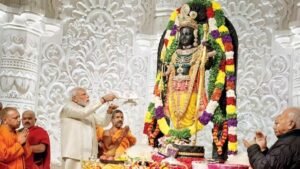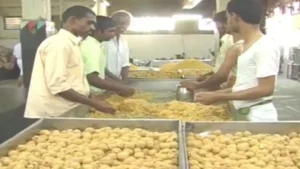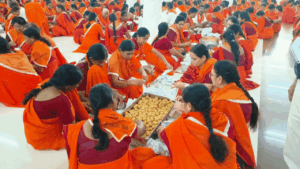300 kg Tirupati Laddoos Distributed at Ayodhya Ram Temple: Chief Priest Confirms Amid Controversy

In a significant event marking the intersection of devotion and cultural heritage, approximately 300 kg of Tirupati laddoos were distributed during a ceremony at the Ram Temple in Ayodhya. This distribution, confirmed by the chief priest, comes amid ongoing controversies surrounding the quality and ingredients of these sacred offerings.
Background of the Laddoo Distribution

The distribution of Tirupati laddoos at the Ayodhya Ram Temple took place as part of a larger celebration linked to the temple’s inauguration and its significance in Hindu culture. The laddoos, known for their unique taste and revered status, are traditionally prepared at the Tirumala Tirupati Devasthanams (TTD) and have been an integral part of temple offerings for over 300 years.The event was attended by numerous devotees and dignitaries, highlighting the laddoo’s role as a symbol of faith and community among Hindus. The chief priest emphasized that the distribution of these laddoos serves to spread blessings and goodwill among devotees.
Current Controversy

While the distribution of the laddoos was intended to be a joyous occasion, it comes against the backdrop of serious allegations regarding the quality of ghee used in their preparation. Recent reports have claimed that animal fats, including beef tallow and fish oil, were found in ghee supplied for making these laddoos, leading to widespread outrage among devotees.The controversy began when Andhra Pradesh Chief Minister N. Chandrababu Naidu accused the previous YSR Congress Party (YSRCP) government of using substandard ingredients, compromising the sanctity of temple offerings. Lab tests allegedly confirmed these claims, sparking a political firestorm as various parties exchanged blame.
Anand Ranganathan’s Exposé

Author Anand Ranganathan has been vocal in highlighting these issues, asserting that Hindus have been misled into consuming offerings that do not meet their dietary restrictions. He stated, “The alleged use of beef fat in sacred prasadam is not just an issue of food safety; it strikes at the core of our cultural identity.”His comments have resonated with many devotees who feel betrayed by what they perceive as a violation of their religious practices.
Implications for Devotees

- Erosion of Trust: The allegations regarding the use of animal fats have led to significant distrust among devotees towards TTD and its management. Many are questioning whether they can continue to accept prasadam from the temple.
- Calls for Investigation: There is growing demand for a thorough investigation into TTD’s sourcing and quality control processes to ensure that only pure ingredients are used in preparing sacred offerings.
- Cultural Sensitivity: The controversy highlights sensitivities surrounding dietary practices within Hinduism. Any perceived compromise on food purity can lead to backlash from the community.
Conclusion
The distribution of 300 kg of Tirupati laddoos at the Ayodhya Ram Temple is a testament to the enduring significance of these offerings in Hindu culture. However, it is overshadowed by serious allegations regarding ingredient quality that threaten to undermine trust among devotees. As investigations continue and political debates unfold, it will be crucial for TTD to address these concerns transparently to restore faith in one of India’s most cherished religious traditions.For ongoing updates on this developing story and reactions from political leaders, stay tuned to reliable news sources covering religious affairs and community sentiments in India.
Discover more from
Subscribe to get the latest posts sent to your email.







